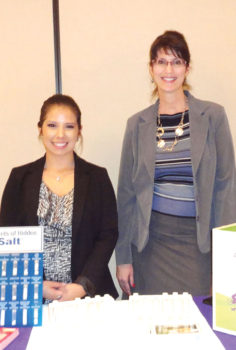
Rebecca Martinez, intern, and Dr. Anna Love, PhD, RD, LC
Marie Milleage
Dr. Anna Love presented a thought-provoking seminar about the prevention, diagnosis and treatment of metabolic syndrome. On July 5 over 60 residents attended the event and learned that a specific group of risk factors can cause metabolic syndrome. The term “metabolic” refers to the biochemical processes involved in the body’s normal functioning.
Metabolic syndrome is not an actual disease but a clustering of signs and symptoms that, when combined, cause a chronic disease. A diagnosis of metabolic syndrome is detected by evaluating the results of a physical examination and blood tests.
In Dr. Love’s presentation the criteria for this ailment is identified by the existence of any three of the following five risk factors in adults: abdominal obesity, low HDL cholesterol level, high triglyceride level, high blood pressure reading and fasting blood glucose. Children are at risk as well with risk factors similar to adults of abdominal obesity, low HDL cholesterol, high triglycerides, high blood pressure and diabetes.
An extensive discussion of the five risk factors followed. Abdominal obesity, also known as an “apple-shaped figure,” appears as a large waistline with excess weight around the waist with circumference measurements of more than 35 inches in women and 40 inches or more in men. Cholesterol readings of a high triglyceride level (LDL) of more than 150 mg and/or a low cholesterol level (HDL) of less than 50 mg for women and less than 40 mg for men. A blood pressure level of 130/85 or more, diagnosed as high blood pressure. A fasting blood sugar level of 166 mg or higher, diagnosed as diabetes. A fasting blood level between 100-125 mg is considered prediabetes.
According to recent American Heart Association information, people with metabolic syndrome are more likely to have or die of a heart attack or stroke and more likely to be diagnosed with diabetes. Metabolic syndrome can be treated and prevented by maintaining a healthy weight, eating a heart-healthy diet including nutrient dense foods, participating in physical activity, reducing stress, having regular health examinations and following healthcare providers’ instructions.
A group workshop is scheduled by Dr. Love at the home of a Robson Ranch resident. For more information about the workshop and future meetings or to participate, contact Dr. Love at info@lovetolivewell.com or the Living Well website at www.rrlwc.com.
DATCU credit union provided refreshments and door prizes at the event. Living Well seminars are free and open to Robson Ranch residents with advance registration. For more information please view the Living Well website, www.rrlwc.com, or contact Marie Milleage at milleagem@mygrande.net.
All content within presentations sponsored by the Living Well at Robson Ranch Committee is intended for general information only. It should not be treated as a substitute for the medical advice of a professional health care provider. Neither the Living Well at Robson Ranch Committee, Robson Ranch Denton HOA, nor Robson Communities is responsible or liable for the content and do not endorse any commercial product or service mentioned or advised in any presentation.
